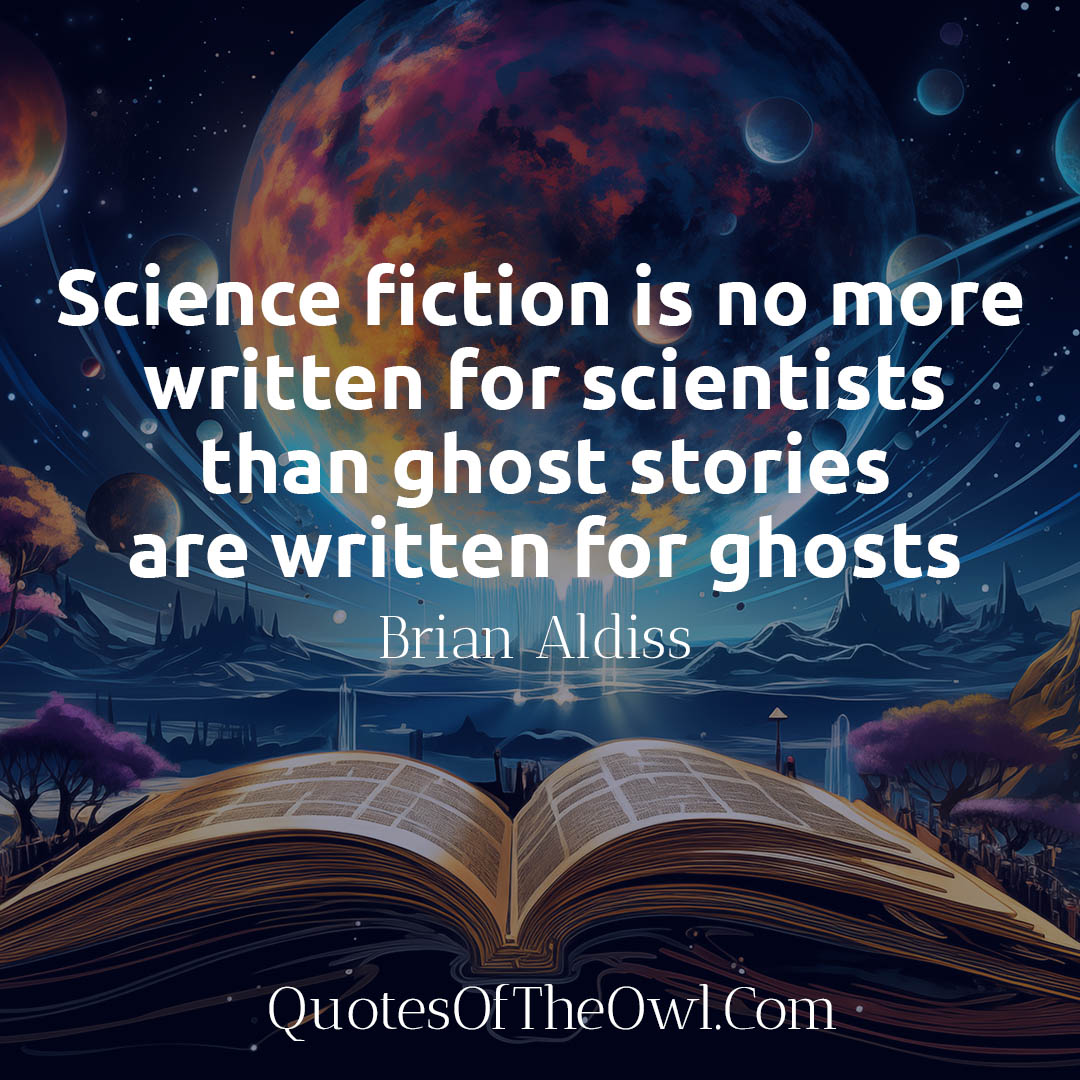Science fiction is no more written for scientists than ghost stories are written for ghosts – Brian Aldiss
Brian Aldiss, a prominent English writer known for his science fiction works, once made a statement that resonates deeply within the literary world: “Science fiction is no more written for scientists than ghost stories are written for ghosts.” This quote encapsulates the essence of science fiction and challenges the common misconception that the genre is exclusive to scientific minds.
Understanding the Quote
Defining Science Fiction
Before delving into Aldiss’ quote, it’s essential to understand what science fiction entails. Science fiction, often abbreviated as sci-fi, is a genre of speculative fiction that explores imaginative concepts such as futuristic science and technology, space exploration, time travel, parallel universes, and extraterrestrial life.
Interpreting “Written for Scientists”
When Aldiss suggests that science fiction is not “written for scientists,” he implies that the genre’s primary purpose isn’t solely to cater to individuals with a scientific background or expertise. Instead, science fiction serves a broader audience, encompassing readers from various walks of life.
Interpreting “Written for Ghosts”
Comparing science fiction to ghost stories, Aldiss highlights the universality of both genres. Ghost stories, although often associated with supernatural elements, are not exclusively intended for ghosts but rather for human consumption. Similarly, science fiction transcends the boundaries of scientific knowledge and captivates audiences beyond the realm of science enthusiasts.
Science Fiction: A Genre for All
Appeal to Imagination
One of the defining characteristics of science fiction is its ability to ignite the imagination of readers. By presenting speculative scenarios and futuristic concepts, science fiction encourages readers to ponder the possibilities of the unknown and envision worlds beyond their current reality.
Social Commentary
Beyond its entertainment value, science fiction serves as a platform for social commentary. Through allegorical narratives and futuristic settings, authors use the genre to address contemporary issues, challenge societal norms, and explore the consequences of scientific advancements on humanity.
Entertainment Value
While science fiction often explores complex themes and speculative ideas, it remains inherently entertaining. The genre offers exhilarating adventures, intricate plots, and compelling characters that appeal to readers seeking escapism and excitement.
Similarities between Science Fiction and Ghost Stories
Exploration of the Unknown
Both science fiction and ghost stories share a common theme of exploring the unknown. Whether delving into uncharted territories of outer space or unraveling mysteries of the supernatural, these genres captivate audiences by tapping into the realm of uncertainty and wonder.
Reflecting Human Fears and Desires
Furthermore, both genres reflect human fears, desires, and existential questions. Whether it’s the fear of the unknown, the desire for exploration, or the quest for understanding life’s mysteries, science fiction and ghost stories offer insights into the human psyche and collective consciousness.
Audience Perspective
Who Reads Science Fiction?
Contrary to popular belief, the audience for science fiction is incredibly diverse. While some readers may possess a keen interest in science and technology, many others are drawn to the genre for its imaginative storytelling, thought-provoking themes, and compelling narratives.
Diverse Readership
From avid fans of space opera to enthusiasts of dystopian fiction, science fiction attracts readers from all age groups and backgrounds. Whether it’s through books, films, television shows, or interactive media, the genre continues to captivate audiences worldwide.
Impact of Science Fiction
Inspiring Scientific Innovation
Science fiction has played a significant role in inspiring scientific innovation and technological advancements. Many scientists, engineers, and inventors cite science fiction as a source of inspiration for their groundbreaking discoveries and inventions.
Cultural Influence
Moreover, science fiction has left an indelible mark on popular culture, influencing art, literature, film, and technology. Iconic franchises such as “Star Trek,” “Star Wars,” and “Doctor Who” have become cultural phenomena, shaping the collective imagination and inspiring generations of fans.

